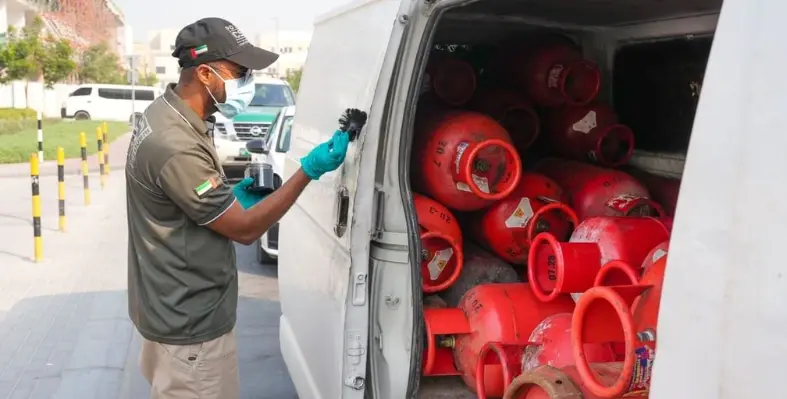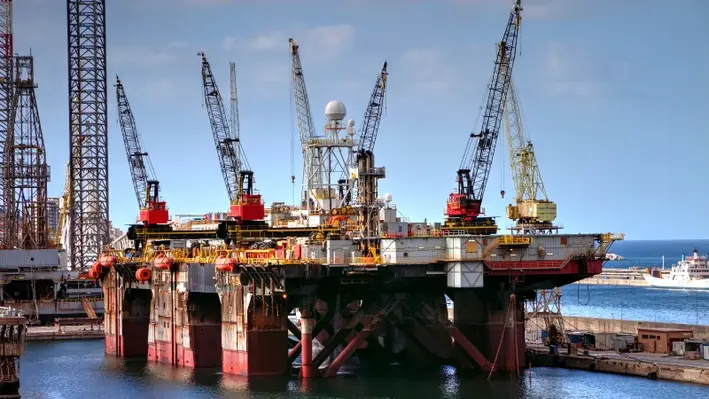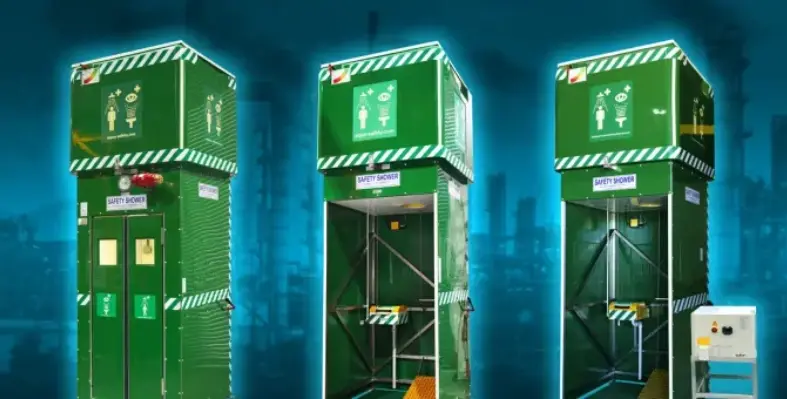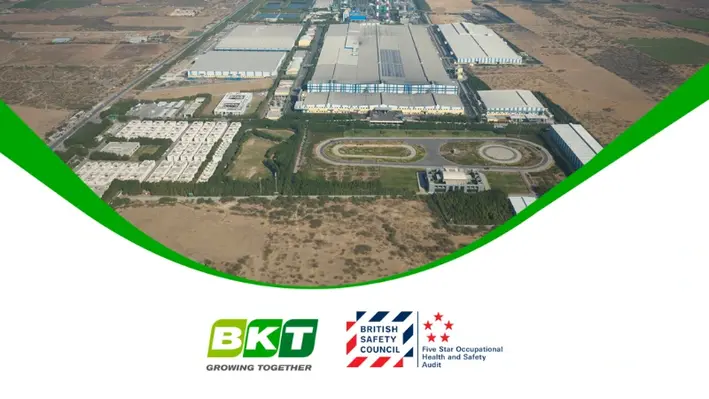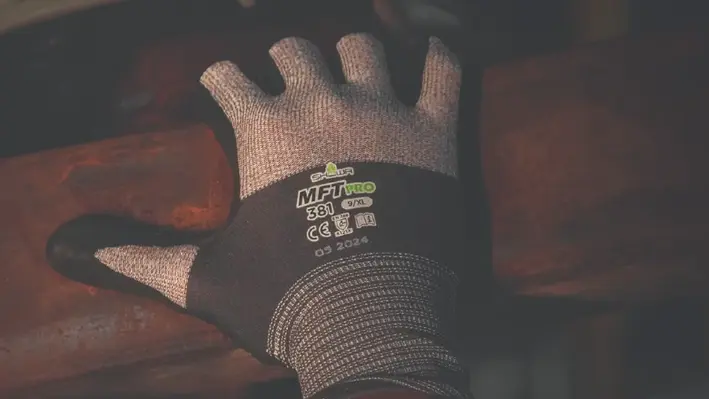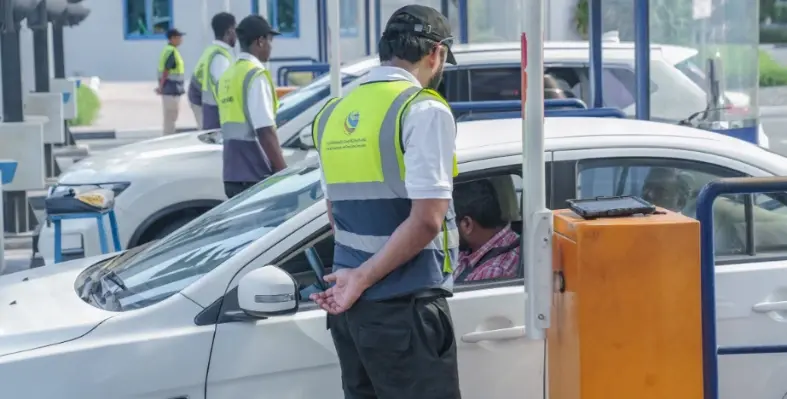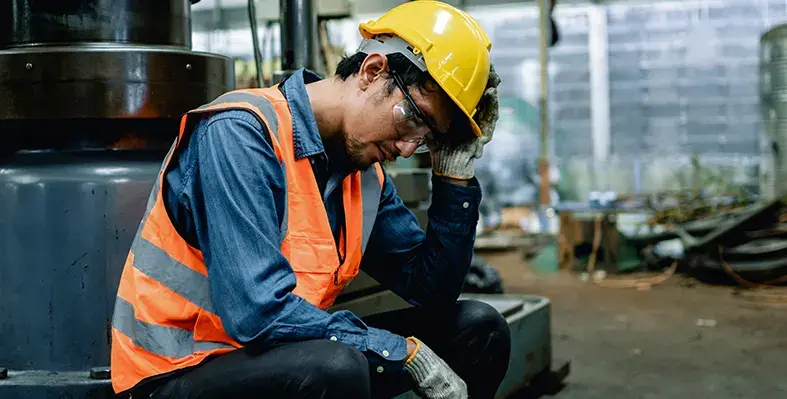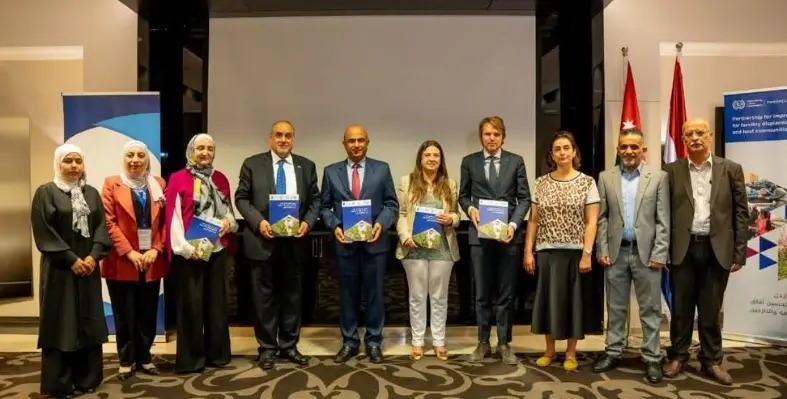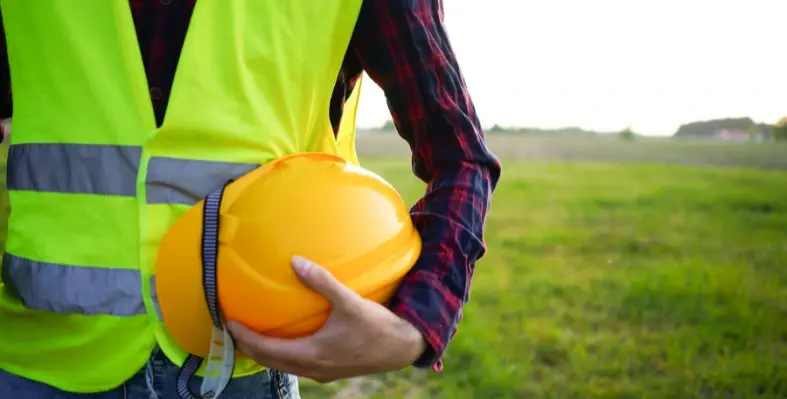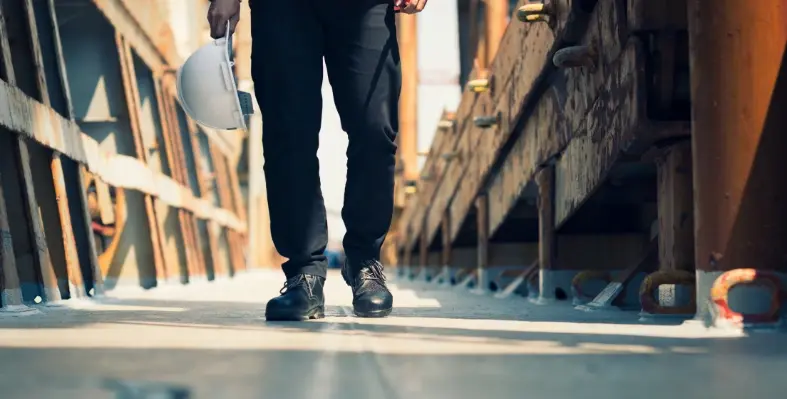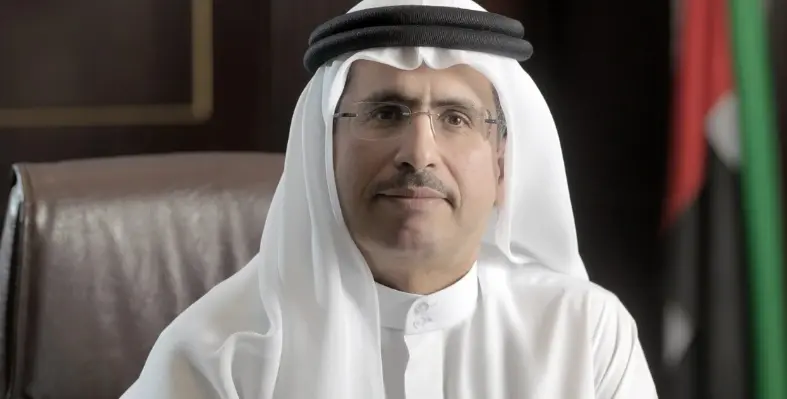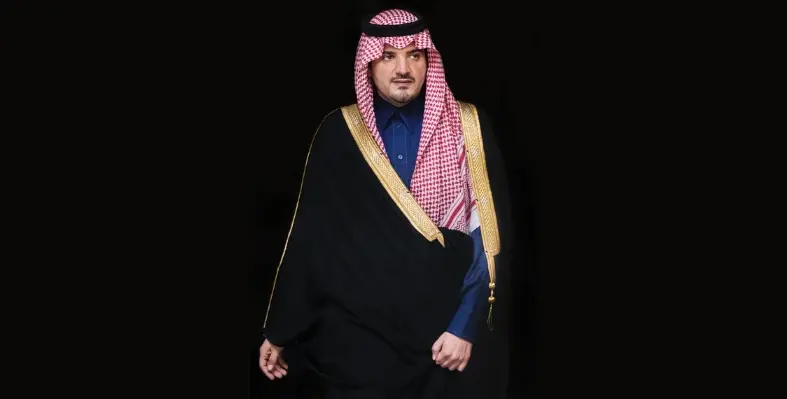Industrial Insights
Industrial Insights
- Details
- Sania Aziz
- Industrial Insights
- Date: 2 September, 2025
- Year: 2025
Dubai’s Roads and Transport Authority (RTA) has intensified its oversight of household gas distribution operations, conducting 4,322 field inspections as part of its commitment to public safety and professional regulation of commercial transport.
The inspections, carried out between 2023 and the first half of 2025, resulted in 1,098 violations issued through joint campaigns led by the Dubai Regulatory Committee for Petroleum Products Trading, comprising 15 entities across the Emirate.
Saeed Al Ramsi, Director of Licensing Activities Monitoring at RTA’s Licensing Agency, called on all household gas distribution businesses to strictly comply with regulations and use only licensed vehicles. He emphasised that RTA will maintain rigorous inspections and take firm legal action against violators to ensure the safety of Dubai’s residents and uphold service quality standards.
“Household gas distribution is a critical activity with direct implications on the environment, public health, and safety. It requires strict oversight to ensure full compliance with licensing requirements and identify counterfeit or untraceable gas cylinders, thereby avoiding serious potential risks,” said Al Ramsi.
“These campaigns are part of RTA’s efforts to realise its strategic objectives of enhancing public safety, advancing environmental sustainability, and boosting operational efficiency across the transport sector, ultimately supporting the goal of a safe and happy urban environment for all residents,” he added.
“The campaigns covered multiple locations across the Emirate. Among the most serious violations recorded were the possession of counterfeit or unverified gas cylinders, and the unauthorised practice of transport and rental activities without the necessary permits. Approximately 170 non-compliant vehicles were impounded over the course of these operations.”
- Details
- Sania Aziz
- Industrial Insights
- Date: 1 September, 2025
- Year: 2025
HIMA Group, the global safety automation expert, is setting new benchmarks for functional safety in the offshore sector as the energy industry undergoes rapid transformation. From oil and gas to offshore wind, hydrogen, and carbon storage, HIMA continues to deliver solutions that enhance safety, security, and efficiency across the entire energy mix.
With Sella Controls and Origo Solutions now part of the HIMA Group, operators and contractors benefit from combined expertise and a significantly expanded portfolio covering the full safety automation value chain. This integration creates synergies that strengthen project delivery for both conventional and renewable offshore applications.
Central to HIMA’s offering is its independent open safety platform, which unites hardware and software within a single framework. Certified by TÜV, Lloyd’s Register, Bureau Veritas and DNV, the platform ensures functional safety and operational technology security while supporting compliance, process efficiency, and plant availability.
The company is also advancing its #safetygoesdigital strategy, introducing technologies that bring digitalisation to every stage of the safety lifecycle.
Its portfolio includes SCADA+ for scalable plant control and visualisation across wind, hydrogen, and oil and gas projects; Safety Lifecycle Digitalisation (SLD) Cockpits, which monitor operating data in real time to optimise productivity and compliance; and High-Integrity Pressure Protection Systems (HIPPS) with Planar 4 technology for critical offshore applications.
HIMA also offers SIL3-compliant turbomachinery control systems with advanced load-sharing features, FLOWorX® Pipeline Management & Control for leak detection and real-time monitoring of even hydrogen pipelines, and SafeHMI solutions designed with inherent safety features for plant operations and digitalised management of change.
Having already delivered major offshore projects in collaboration with Sella Controls and Origo Solutions, HIMA brings together consulting, engineering, and project execution expertise under one roof. This strengthened capability positions the group as a partner of choice for clients seeking to navigate the challenges of today’s evolving energy landscape while ensuring the highest levels of safety and operational resilience.
Jörg de la Motte, CEO of the HIMA Group, said, "We are delighted to present our enhanced solutions portfolio for the first time. The integration of Sella Controls and Origo Solutions proves the power of combined expertise and delivers added value to our offshore customers in the UK, in Norway, and in Continental Europe.”
- Details
- Sania Aziz
- Industrial Insights
- Date: 1 September, 2025
- Year: 2025
Maintaining cool water in safety shower header tanks is essential for effective emergency decontamination. Insulation, shading, cooling systems, and regular monitoring ensure safe, reliable performance even in hot climates. In this short article, Aqua Safety Showers explains why and how.
Safety showers are a critical component of workplace safety, providing immediate decontamination in case of hazardous substance exposure. However, in certain regions or industries with hot climates, maintaining cool water in safety shower header tanks can be a challenge.
High water temperatures can cause discomfort, possible scalding and can further exacerbate injuries.
This is why it is essential to keep water cool in the safety shower header tank at all times of the day and night whilst ensuring optimal functionality and employee well-being during emergencies.
1. Insulation:
Proper insulation is key to minimising heat transfer and maintaining cooler water temperatures in safety shower header tanks. Insulating materials, such as foam or thermal wraps, can be applied to the tanks and associated pipes to create a barrier against external heat sources. This insulation helps preserve the initial water temperature and prevents heat absorption from the surrounding environment.
2. Shade or Shelter:
Placing safety shower header tanks in shaded or sheltered areas can shield them from direct sunlight and excessive heat. By positioning the tanks away from direct exposure to the sun's rays, the water temperature within the tanks can be significantly reduced.
Utilising natural shade or constructing shelters can effectively protect the tanks from heat buildup and help maintain cooler water.
3. Cooling:
Incorporating a water cooler to the safety shower header tank is the most reliable and effective solution for maintaining water temperature. These coolers circulate the water, ensuring the temperature of the water within the tank will not rise above 25°C.
4. Monitoring and Maintenance:
Continuous monitoring of the safety shower system is crucial to identify any potential issues that may affect water temperature and shower operation. Regular inspections, maintenance, and servicing of the unit is essential to ensure their proper function.
Maintaining cool water in safety shower header tanks is vital for ensuring effective emergency decontamination and the well-being of employees. By implementing strategies such as insulation, shade or shelter, cooling systems, temperature regulation, regular water replacement, and vigilant monitoring, organisations can overcome the challenges posed by high ambient temperatures.
These measures ensure that safety showers deliver water at a comfortable temperature, encouraging their proper use during emergencies. By prioritising the cooling of safety shower header tanks, workplaces can enhance their emergency response capabilities, minimise the risk of injury, and promote a culture of safety.
- Details
- Sania Aziz
- Industrial Insights
- Date: 29 August, 2025
- Year: 2025
BKT has announced that its Bhuj manufacturing plant has successfully achieved the coveted Five Star Occupational Health and Safety Audit rating, following a rigorous assessment conducted by the British Safety Council.
Announcing the news on its LinkedIn account, BKT said that the Five Star Audit is recognised globally as a best-practice benchmark in health and safety performance. The detailed evaluation involved a review of BKT’s occupational health and safety policies, processes, and practices. It also included interviews with senior management and employees, engagement with key stakeholders, and sampling of operational activities across the plant.
The five-star grading reflects BKT’s strong emphasis on safeguarding the wellbeing of its workforce while ensuring operational excellence. By attaining this rating, BKT has demonstrated its ongoing commitment to continually improving its health and safety management systems and aligning with international standards.
The British Safety Council, a leading authority on workplace health, safety and environmental management, stresses that no one should be injured or made ill through their work. BKT has echoed this philosophy by embedding a culture of prevention and care across its operations.
This achievement at the Bhuj plant is not only a recognition of BKT’s dedication to employee welfare but also a testament to the company’s vision of sustainable and responsible growth. The recognition strengthens BKT’s reputation as a manufacturer that prioritises the health, safety and wellbeing of its people while delivering on its long-term business objectives.
“We are extremely proud to have been awarded the prestigious five-star rating by the British Safety Council,” commented Rajiv Poddar, joint managing director of BKT.
“This recognition highlights our ongoing commitment to ensuring a safe, secure, and people-focused working environment. Health and safety are fundamental values at BKT and form an essential part of our corporate culture and long-term strategy.”
- Details
- Sania Aziz
- Industrial Insights
- Date: 28 August, 2025
- Year: 2025
This article was written by SHOWA, a global leader in hand protection, highlighting how the right PPE can play a vital role in tackling heat stress and improving worker safety in extreme Middle Eastern climates.
In the Middle East, where summer temperatures frequently climb above 40°C, managing heat stress is a daily reality for employers and workers alike. While it is easy to picture heat stress in extreme terms - heatstroke, fainting, or hospital visits - most of its impact is far more subtle and accumulative. Everyday discomfort, reduced focus, and increased fatigue all affect performance long before heat becomes a medical emergency.
One area that is rarely considered in regard to heat stress is the hand. For workers in industries such as construction, oil and gas, and logistics, gloves are an essential part of their personal protective equipment. Yet, gloves can quickly become a source of discomfort in hot conditions, trapping sweat and restricting airflow. When hands overheat, concentration falters, grip weakens, and the risk of errors rises.
Heat stress as a widespread issue
According to the International Labour Organization (ILO), more than 80% of workers in the Arab States are regularly exposed to excessive occupational heat. In practice, this means that heat is not an occasional hazard but a constant factor shaping how work must be managed across the region. Even with government-mandated midday rest breaks in some countries, studies show that the most intense heat stress often occurs before or after these periods. Workers continue to face challenging temperatures for much of the working day.
This constant exposure makes it vital to think about heat stress in broader terms than just emergencies. Sweaty palms, difficulty concentrating, and fatigue may not generate headlines, but they contribute to lower productivity and higher accident risk. Research has shown that injury risks are significantly higher on hotter days, even when rest periods are observed. The link is clear: as temperatures rise, so does the likelihood of accidents.
Why hands matter
Hands are at the centre of most tasks in the industries referenced above - lifting, handling tools, operating machinery, assembling parts. They are also among the first areas to suffer in the heat. One of the earliest symptoms of heat stress is difficulty concentrating, and glove discomfort can play a direct role in this. When gloves trap moisture, they not only cause irritation but also compromise dexterity and grip. Workers may find themselves adjusting gloves more frequently, working more slowly, or even removing protection altogether to cool down - which raises the risk of injury.
This is where the design of PPE becomes a critical factor. Just as hard hats are ventilated and high-visibility clothing is made from breathable fabrics, gloves too must evolve to meet the demands of hot working environments. Materials that wick moisture away from the skin, promote evaporation, and allow air circulation can make the difference between hands that feel clammy and fatigued, and hands that stay cool and effective throughout the day.
SHOWA’s research and product development in this area highlight how much of a difference material science can make. For example, its MFT PRO gloves use ultra-fine microfibres that absorb sweat in just over three seconds - more than twice as fast as traditional nylon liners, and significantly quicker than some mixed fibres. They also dry nearly twice as fast as comparable models. This means that moisture does not linger, reducing irritation and helping workers maintain a firm grip for longer periods.
The benefits of such innovation extend well beyond comfort. By reducing the distraction of damp gloves, workers can stay focused on their tasks. By maintaining grip, they reduce the risk of dropping tools or mishandling materials. And, by ensuring gloves remain wearable for a whole shift, employers reduce the likelihood that workers will discard PPE altogether.
A proactive approach
Heat stress will always be a challenge in the Middle East. Climate data shows that hot periods are arriving earlier in the year and lasting longer, extending the window of risk for outdoor and industrial workers. Employers cannot change the weather, but they can change how work is organised and how equipment is specified. By selecting PPE designed with heat stress in mind, companies show that they recognise the reality of daily discomfort as well as the risk of medical emergencies.
Ultimately, tackling heat stress is about seeing the full picture. It is not only the dramatic cases that matter, but also the everyday experiences of workers whose performance is shaped by how comfortable, focused, and protected they feel. Cool hands lead to clear heads, and in the heat of the Middle East, that is a vital advantage.
- Details
- Sania Aziz
- Industrial Insights
- Date: 27 August, 2025
- Year: 2025
The UAE's Ports, Customs and Free Zone Corporation (PCFC) has reported exceptional progress in smart traffic enforcement during the first half of 2025, recording a 401% increase in processed violations compared to Q1, with a response rate of 60.4%.
Sultan Al Malik, Director of the Security Department at the PCFC, said, “This growth was not only in numbers, but a manifestation of a comprehensive strategic vision that turned smart enforcement into a tangible reality serving all stakeholders and clients. The results of the first half of this year highlight the effectiveness of integrating smart systems with field teams, paving the way for more precise and proactive enforcement.”
Al Malik emphasised that the Security Control and Command Division reflects a corporate strategy built on advanced technology, multi-agency coordination, and predictive analysis. He explained that the Division has moved from a reactive response model to one led by proactive intelligence, becoming a regional benchmark in integrated smart enforcement.
He added, “The Security Control and Command Division serves as a pioneering model of smart enforcement, relying on advanced technologies and analytics to ensure seamless traffic flow and compliance within free zones under the Corporation’s supervision. Operating 24/7, the Division applies data-driven decision-making and sustainable management practices to uphold the highest safety, environmental, and security standards.”
In H1 2025, the Division managed 1,971 traffic-related violations, resolving 992, including cases of abandoned vehicles, illegal waste disposal, and unauthorised land use. Environmental response achieved 100% compliance within 48–72 hours, with no critical incidents reported.
Active cases stood at 651 by mid-year, categorised into container violations (287), unmarked trailers (198), and infrastructure and signage (166), each addressed through targeted measures.
For H2 2025, the Division plans a 90-day clearance campaign, a centralised dashboard for real-time monitoring, a comprehensive infrastructure audit, and the development of predictive intelligence capabilities ahead of 2026.
- Details
- Louise Waters
- Industrial Insights
- Topic: HSE
- Date: 26 August 2025
- Year: 2025
The World Health Organization (WHO) and the World Meteorological Organization (WMO) have published a new joint report and guidance highlighting the growing global health risks to workers posed by extreme heat
As more frequent and intense heatwaves occur due to climate change, many workers who are regularly exposed to dangerous heat conditions are already feeling the health impacts of rising temperatures, in particular, manual workers in sectors such as agriculture, construction and fisheries. Increasing heat episodes are also leading to health issues for vulnerable populations in developing countries, such as children, older adults and low-income populations. Health risks include heatstroke, dehydration, kidney dysfunction, and neurological disorders, and worker productivity drops by 2–3% for every degree above 20°C.
The new report and technical guidance, entitled ‘Climate change and workplace heat stress’, highlights that the health and productivity of workers are severely impacted by rising temperatures. WMO reports that 2024 was the hottest year on record. Daytime temperatures of more than 40°C and even above 50°C are becoming increasingly common, a clear indication that immediate action is needed to address the worsening impact of heat stress on workers worldwide.
To tackle these challenges, the report calls for the implementation of occupational heat action plans, tailored to specific industries and regions, and developed in collaboration with employers, workers, unions, and public health experts.
Recommended actions
The recommended actions include:
- Develop occupational heat-health policies with tailored plans and advisories that consider local weather patterns, specific jobs, and worker vulnerabilities;
- Focus on vulnerable populations with special attention given to middle-aged and older workers, individuals with chronic health conditions, and those with lower physical fitness who can be more susceptible to the effects of heat stress;
- Education and awareness raising for first responders, health professionals, employers, and workers to recognize and properly treat heat stress symptoms, which are often misdiagnosed;
- Engage all stakeholders from workers and trade unions to health experts and local authorities in the co-creation of heat-health strategies that are locally relevant and widely supported.
- Design solutions that are not only effective but also practical, affordable and environmentally sustainable, ensuring policies can be implemented at scale.
- Embrace innovation by adopting technologies that can help safeguard health while maintaining productivity.
- Support further research and evaluation to strengthen the effectiveness of occupational heat-health measures and ensure maximum protection for workers worldwide.
The new report and technical guidance follow the recent International Labour Organization (ILO) reports which highlight that more than 2.4bn workers are exposed to excessive heat globally, resulting in more than 22.85mn occupational injuries each year.
“Heat stress is already harming the health and livelihoods of billions of workers, especially in the most vulnerable communities,” said Dr Jeremy Farrar, WHO assistant director-general, Health Promotion, Disease Prevention and Care. “This new guidance offers practical, evidence-based solutions to protect lives, reduce inequality, and build more resilient workforces in a warming world.”
- Details
- Sania Aziz
- Industrial Insights
- Date: 20 august, 2025
- Year: 2025
The Ministry of Labor, in collaboration with the International Labour Organization (ILO) and local and international partners, has launched a guidance manual on occupational safety and health (OSH) for the agriculture sector, according to a report by Jordan News Agency (Petra).
Iman Abdallat, acting director of the Occupational Safety and Health Directorate at the Ministry of Labor, said the manual underscores Jordan’s commitment to safe and healthy workplaces.
A safe work environment is a basic human right and a key driver of productivity, reducing economic losses from accidents and injuries, and supporting livelihoods and food security, she noted.
Abdallat highlighted that the ministry has updated OSH regulations, instructions, and decisions over the past two years to keep pace with labour-market developments.
These updates complement Agricultural Workers Regulation No. 19 of 2021 and its 2025 amendment, which govern working hours, annual, sick and maternity leave, minimum wage, housing, OSH requirements, and prohibit child labour in hazardous agricultural work.
She added that the ministry is working to foster a national safety culture linked to productivity outcomes.
Mohammad Hiyari, secretary-general of the Ministry of Agriculture, emphasised that improving farmers’ skills and working conditions is central to boosting productivity and quality of life.
He noted that farm workers face multiple risks, including unsafe chemical use, heavy machinery, harsh weather, and lack of protective equipment and training, highlighting the manual’s role as a practical guide prepared by the ILO in coordination with national experts.
Amal Mowafy, ILO Jordan Country Coordinator, said the manual provides comprehensive guidance for employers, inspectors, agricultural extension officers, and workers to identify and prevent workplace hazards, reduce accidents and occupational diseases, and comply with national and international OSH standards.
She added that the initiative supports the creation of decent, safe, and productive workplaces across Jordan’s agricultural subsectors.
Khaled Fanatsa, president of the General Federation of Jordanian Trade Unions, also attended the launch, reinforcing the importance of safeguarding worker rights and promoting a culture of safety across the sector.
The manual is expected to serve as a key reference for ensuring occupational safety while contributing to productivity, sustainability, and the well-being of workers across Jordan’s agriculture industry.
- Details
- Sania Aziz
- Industrial Insights
- Date: 19 August, 2025
- Year: 2025
The global workplace safety market is poised for strong growth, with a projected compound annual growth rate (CAGR) of 13.5% from 2024 to 2031, according to a new report from Verified Market Research.
Valued at US$16.12bn in 2024, the market is expected to reach US$44.39bn by 2031, as organisations worldwide place increasing emphasis on employee health, risk mitigation, and regulatory compliance.
Industries across construction, manufacturing, healthcare, mining, and logistics are accelerating the adoption of smart safety technologies to reduce workplace accidents, safeguard employees, and enhance operational efficiency. Internet of Things (IoT)-enabled wearables, AI-powered monitoring systems, and advanced hazard detection tools are being integrated into daily operations, reflecting the shift toward proactive, technology-driven safety management.
One of the main drivers of growth is the increasing stringency of global safety regulations. Governments and international organisations, including OSHA, ISO, and the International Labour Organization (ILO), have implemented rigorous safety standards. These mandates compel companies to adopt comprehensive safety protocols, implement monitoring technologies, and maintain safer work environments. Compliance pressures are particularly strong in high-risk sectors such as oil & gas, mining, and construction, where workplace incidents can have severe consequences for both personnel and operations.
New technology
Technology adoption is another significant growth catalyst. Smart helmets, sensor-equipped vests, and AI-driven analytics platforms provide real-time monitoring of worker health, environmental hazards, and equipment performance. Predictive maintenance, early hazard detection, and automated incident alerts help prevent accidents and improve operational efficiency. With the ongoing rise of Industry 4.0, these innovations are expected to continue reshaping workplace safety practices globally.
Awareness of employee well-being is also driving demand. Organisations recognise that safety programs not only ensure compliance but also contribute to productivity and retention. Investment in ergonomic solutions, mental health initiatives, and integrated safety management systems reflects a broader focus on environmental, social, and governance (ESG) goals. Both large enterprises and mid-sized companies are embracing technologies and programs that enhance workplace safety and employee trust.
Despite growth opportunities, challenges remain. High initial costs of IoT devices, AI monitoring platforms, and training can limit adoption among small and medium-sized enterprises (SMEs), especially in developing economies. Furthermore, integration challenges with legacy systems and limited awareness in unorganised sectors create gaps in adoption, hindering full-scale implementation of advanced safety solutions.
Geographically, North America dominates the market, driven by strict regulations, a mature industrial base, and early adoption of safety technologies. Europe follows, fueled by strong worker protection laws and rising demand for sustainable safety initiatives. The Asia-Pacific region is emerging as the fastest-growing market, supported by rapid industrialisation in China, India, and Southeast Asia, alongside government efforts to improve workplace safety standards.
Key market players include IBM, Honeywell, 3M, Hexagon AB, Cority, Wolters Kluwer, Bosch, Microsoft, and Appian. As organisations continue to prioritise regulatory compliance, risk management, and technological integration, the global workplace safety market is set for sustained expansion and innovation over the coming decade.
- Details
- Sania Aziz
- Industrial Insights
- Date: 18 August, 2025
- Year: 2025
SafetySam, Singapore’s leading provider of safety solutions and workwear, has unveiled its latest innovation: the WORKSafe Greta Safety Boot.
According to the company, Greta embodies a blend of craftsmanship and modern safety engineering. Drawing inspiration from traditional leather boots and the designer’s admiration for Goodyear-welted construction, the boot was created to fill a gap in Singapore’s market for footwear that is durable, stylish, and fully functional in tough working conditions.
“Cemented and injection-moulded soles just don’t cut it in our humid climate,” said Jeffrey Seah, general manager at PDS International. “We needed a boot that wouldn’t split, would age well, and still meet the demands of modern workers.”
Certified to EN ISO 20345:2022+A1:2024 and SS513:2005 standards, Greta has been tested and endorsed by workers across construction, oil and gas, manufacturing, and logistics.
Its key performance features include Goodyear-welted construction for long-lasting durability and water resistance, a natural latex outsole with superior grip and hot contact resistance, and a metatarsal impact gel guard for foot protection.
Other elements such as a penetration-resistant sole, antistatic protection, and energy absorption heel are designed to deliver safety without sacrificing comfort. With a waterproof and breathable HBR lining, the boot achieves full S7S compliance, ensuring all-round reliability in challenging work environments.
Through Greta, SafetySam aims to reinforce its vision that safety gear can be practical, delivering a balance of endurance, protection, and character to the professionals who depend on it.
- Details
- Sania Aziz
- Industrial Insights
- Date: 15 August 2025
- Year: 2025
The Dubai Supreme Council of Energy (DSCE), the authority overseeing the trading of petroleum products in the emirate, has ramped up inspection campaigns targeting the gas oil (diesel) sector in Ras Al Khor.
The initiative aims to safeguard public safety, protect the environment, enforce compliance with local laws, and crack down on illegal activities involving the distribution of these critical fuels.
A permanent joint field inspection team, established under DSCE Resolution No. (1) of 2022, has begun conducting on-site inspections and monitoring operations.
This effort is being carried out in collaboration with key government and industry stakeholders, including the Dubai Civil Defense, Roads and Transport Authority, Dubai Municipality, Department of Economy and Tourism, Ministry of Industry and Advanced Technology, and Emirates National Oil Company (ENOC).
HE Saeed Mohammed Al Tayer, Vice Chairman of Dubai Supreme Council of Energy said, “These inspection campaigns form an essential part of our continuous efforts to entrench the highest standards of safety and compliance across all vital energy-related activities in the Emirate of Dubai. This aligns with the directives of our wise leadership to ensure secure and transparent trading of petroleum products. Regulating the gas oil (diesel) trading sector is a central pillar of our comprehensive efforts. We work integrally with relevant entities to confront violations that threaten safety or undermine investor and stakeholder confidence. We reaffirm our commitment to providing an operational environment characterised by both efficiency and responsibility, supporting the sustainable development journey of Dubai and the UAE.
"The DSCE seeks to apply the highest standards of security and safety in all diesel trading activities, including transport, storage, and distribution, whether through diesel trading facilities or via transport and distribution tankers. We thank all government entities participating in implementing these campaigns, stressing the continuation of rigorous oversight and coordination with relevant competent government authorities to ensure the application of the standards. This aims to protect individuals, society, and institutions alike by verifying compliance of trading and distribution practices in the petroleum products sectors with the Council's decisions and ensuring the effective implementation of policies regulating petroleum product trading in Dubai."
HE Ahmad Buti Al Muhairbi, Secretary General of DSCE and Chairman of Dubai Regulatory Committee for Petroleum Products, emphasised that ensuring compliance with the approved specifications and standards for gas oil (diesel) is one of our top priorities. These inspection campaigns reflect our steadfast commitment to achieving a fair and sustainable business environment and protecting the rights of consumers and law-abiding suppliers.
Burhan Al Hashemi, Vice Chairman of the Committee said, “The most prominent violations uncovered included the storage and trading of diesel in unlicensed and unauthorised facilities, as well as trading, selling, or distributing the product at locations and via transport means that are unlicensed and non-compliant with UAE specifications."
- Details
- Sania Aziz
- Industrial Insights
- Date: 14 August 2025
- Year: 2025
Intersec Saudi Arabia, the Kingdom’s leading platform for the security, safety, and fire protection industries, will be held under the patronage of His Royal Highness Prince Abdulaziz bin Saud bin Naif bin Abdulaziz Al Saud, Minister of Interior, in association with the General Directorate of Civil Defense.
Organised by 1st Arabia and licensed by Messe Frankfurt, the event will take place at the Riyadh International Convention and Exhibition Centre (RICEC) from 29 September-1 October. This year marks the largest edition to date, featuring over 370 exhibitors and attracting more than 27,000 visitors, all focused on the specific needs of the Saudi market. The event serves as a platform for global innovators, government leaders, and industry pioneers to strengthen national resilience and support future growth.
CPD-certified content and specialised summits
Intersec Saudi now offers CPD-certified content theatres, providing attendees with accredited learning opportunities alongside the exhibition.
The highly anticipated Future Security Summit, powered by ASIS International Dhahran Chapter, will return, bringing together global experts to discuss the trends shaping public safety and national resilience. Topics will range from AI-driven surveillance and predictive policing to mega-event protection and critical infrastructure security, offering insights into both challenges and solutions that are shaping the security landscape in Saudi Arabia and beyond.
Fire Protection and Technology Summit
The Fire Protection and Technology Summit will also return, highlighting the future of fire and emergency response. International leaders will explore innovations in areas such as smart city firefighting, high-rise rescue, HAZMAT response, and regional disaster collaboration. Key themes include talent investment for building human capital in fire protection and safety at scale, as well as strategies for safeguarding GIGA developments during large-scale events in the Kingdom.
By combining large-scale exhibition opportunities with high-level summits, Intersec Saudi Arabia continues to provide a comprehensive platform for professionals and organisations to engage, learn, and advance the security, safety, and fire protection sectors in the Kingdom.
